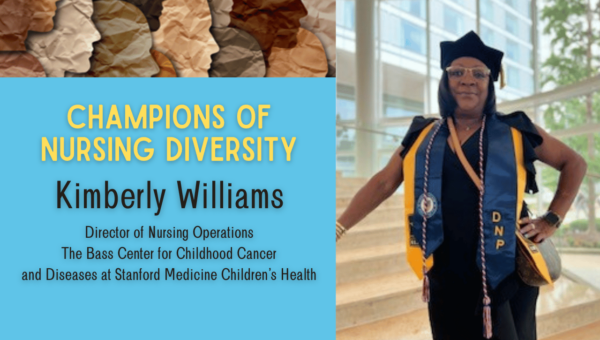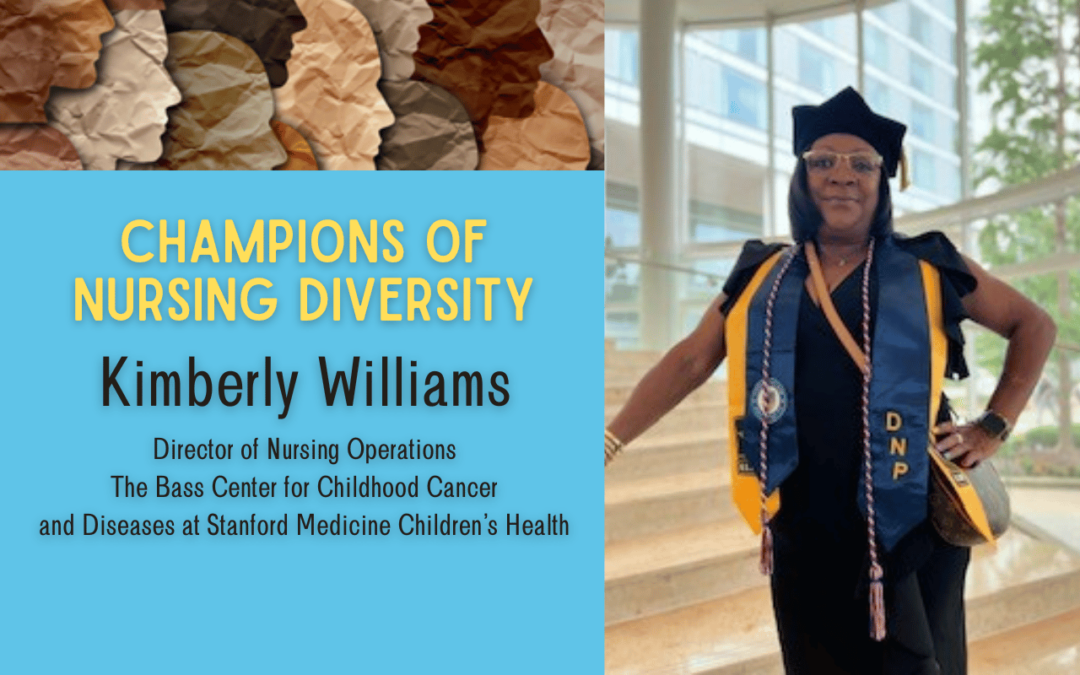Kimberly M. Williams, DNP, MSN, RN, NE-BC, has dedicated her career to serving patients at every level. She started in health care as a front desk clerk and worked up to her current position as the Director of Nursing Operations at the Bass Center for Childhood Cancer and Blood Diseases at Stanford Medicine Children’s Health.
Williams is an important nursing leader, and we are honored to feature her in the Champions of Nursing Diversity Series 2024. This series highlights healthcare leaders who are prominent figures in their organizations and are making significant changes in the nursing field.
Meet Kimberly Williams, DNP, MSN, RN, NE-BC, Director of Nursing Operations at The Bass Center for Childhood Cancer and Diseases at Stanford Medicine Children’s Health.
Talk about your role in nursing.
I am the director of nursing operations at The Bass Center for Childhood Cancer and Diseases at Stanford Medicine Children’s Health. As the director of nursing operations at a world-class pediatric hospital, I hold a multifaceted role encompassing numerous responsibilities. My role extends beyond the provision of patient care and involves strategic decision-making and ensuring the overall efficiency and effectiveness of the Center’s nursing operations. To do so effectively, I partner with over 180 nurses throughout the Bass Childhood Cancer Center’s various departments, including hematology, oncology, stem cell transplant, and the Center for Definitive and Curative Medicine. We deliver compassionate, high-quality care to our young patients and their families.
As the chair of the Patients and Families Committee on the house-wide Diversity, Equity, and Inclusion Council, I actively address health disparities, advocate for culturally sensitive care, and promote diversity, equity, and inclusivity within the healthcare system. I also mentor aspiring nurses, guiding and empowering them to pursue their dreams and overcome obstacles.
Tell us about your career path and how you ascended to this role.
My path progressed with a series of fits and starts. As a parent, I had to juggle motherhood, a full-time job, and my academics, so it took me roughly six years to obtain my BSN. Upon graduating from Texas Christian University in 2001, I settled into my first nursing role at Cook Children’s Healthcare System on the medical/surgical floor. Still, I always had my eyes on becoming a PICU nurse. After a year there, I transferred to the PACU to get some experience in intubation and sedation. I then transferred to the PICU, where I worked as a nurse and a charge nurse. There, I got the desire to return to school and obtain my master’s. I completed my MSN in 2010 from the University of Phoenix. Afterward, I accepted a job as a nurse manager, where I spent eight years before taking a leap of faith and accepting a position at Stanford Medicine Children’s Health as a patient care manager for The Bass Center for Childhood Cancer and Diseases. I worked in that role for about two years before taking the interim role of director of nursing operations. I have now been in that role for a little over three years.
It’s been a long journey, beginning as a Black, economically disadvantaged girl from a small town outside Pittsburgh, Pennsylvania. Growing up, I faced numerous challenges that could have hindered my progress. However, I was fueled by a burning desire to make a difference, overcome limitations, and pursue my dream of becoming a nurse. I rose above my circumstances to succeed in nursing, and my experience culminated in a leadership position at Stanford Medicine Children’s Health, serving as a testament to determination, resilience, and the power of education.
How long have you worked in the nursing field? Why did you become a nurse?
Sometimes, others can see something within us that we may not recognize.
I have been in nursing for almost 25 years and came into this field by happenstance. I was a single mother of three rambunctious boys at the time, working as a clerk in a children’s hospital. One of the physicians I worked with recognized that I had the qualities and potential to excel as a nurse. She would often tell me I should consider going to nursing school. For over a year, she kept encouraging me and was determined to get me to take one class. I finally agreed. I will never forget the first class I took, Psychology 101. I received an ‘A’ in that course. All I needed to confirm that I could do anything I put my mind to. I owe a lot of gratitude to that doctor. Her encouragement motivated me to pursue a new path and passion, creating a better future for myself and my family. Looking back, I feel that my journey is a true testament to the transformative power of mentorship.
What are the most important attributes of today’s nursing leaders?
I want to be intentional in answering this question from the lens of a Black nurse and DE&I advocate. I feel the most essential attributes of today’s nursing leaders include cultural competency, advocacy, mentorship, and community engagement.
To truly provide equitable, compassionate care, we must recognize and respect the unique cultural dynamics and challenges faced by the diverse communities we serve. As leaders, we must be attuned to these nuances through cultural learning, which equips us to deliver holistic care, meeting each patient’s and their family’s psychological, emotional, spiritual, cultural, and individual needs.
Advocacy is a crucial attribute for leaders in the nursing profession today. We can promote patient rights, ensure patient safety, empower patients with the needed information to make informed decisions, and more through advocacy.
As I mentioned before, mentorship has the power to change lives. When I came into the field, few Black nurses were in any leadership roles. I was often the only Black leader in more rooms than I’d like to remember. And this was the catalyst for my commitment to promoting and supporting up-and-coming nurses and diversity within the profession.
The last attribute I’d like to touch on is the importance of community engagement. People don’t know what they don’t know. As the eyes and ears of some of our most vulnerable populations, we must embed ourselves within our communities to promote community health initiatives, provide educational resources, and collaborate with community leaders to address health disparities and promote health equity.
What is the most significant challenge facing nursing today?
One of the most significant challenges facing nurses today is the persistent disparities and inequities in healthcare access and outcomes among marginalized populations. One key challenge is the need for more diversity within the nursing profession. While progress has been made, nursing continues to struggle with achieving a workforce that reflects the racial, ethnic, and cultural diversity of our communities. A homogenous nursing workforce can limit patients’ ability to connect with and receive culturally sensitive care from healthcare providers who understand their unique needs and backgrounds.
Additionally, biases and discrimination persist within the healthcare system, impeding equitable care delivery. Implicit biases can influence decision-making, communication, and patient interaction, leading to disparities in treatment and outcomes. Moreover, the challenge of healthcare access persists for marginalized populations, including racial and ethnic minority groups, low-income individuals, LGBTQ+ communities, and those with limited English proficiency. These populations face significant barriers, including lack of health insurance, geographic disparities, and social determinants of health, contributing to healthcare inequity.
As a nurse leader, how are you working to overcome this challenge?
As a Black nurse leader, I strive to create inclusive and welcoming healthcare environments.
While often difficult to navigate, we can overcome many challenges by advocating for policies and practices that address these systematic barriers.
Nurses can foster culturally sensitive, competent care by actively listening to patients’ concerns, promoting patient autonomy, and respecting patients’ values and beliefs. As mentioned earlier, I am chair of the Patients and Families Committee on the house-wide Diversity, Equity, and Inclusion Council at Stanford Medicine Children’s Health. In this role, I advocate for inclusive policies and practices that value and support diversity, prevent discrimination, and cultivate an inclusive workplace that celebrates different perspectives and ensures equitable opportunities for professional growth. Through organizational partnerships, Stanford Children’s is addressing some of these challenges by developing nursing-focused education programs that emphasize DE&I as fundamental components of the curriculum. This ensures that our workforce, especially nurses, are clinically skilled and culturally educated. Ongoing diversity training, mentorships, and continued education opportunities can promote nurses’ understanding of diverse patient populations and foster inclusive practices.
Despite the numerous obstacles within our profession, I am confident that with continued education and systemic support, nurses can play a vital role in advancing health equity and reducing disparities in healthcare.
What nursing leader inspires you the most and why?
There are so many who inspire me. When I look at the history of Black nurse leaders, the first person that comes to mind is the remarkable contributions of Mary Eliza Mahoney. Mary Eliza Mahoney (1845-1926) was the first African American registered nurse in the United States. Mahoney’s resilience and dedication to overcoming significant adversity in pursuit of her nursing career during a time of racial discrimination and inequality had a lasting impact on nursing and continue to inspire nurses of all backgrounds to this day.
However, the nurse leader who inspires me the most is my sister-in-law, Dr. Shakyryn Napier, DHS, RN, CPN, NEA-BC, LSSYB, and the Director of the Heart Center at Cook Children’s Healthcare System. Dr. Napier is one of the few Black nurse leaders I’ve enjoyed working alongside for most of my career. She possesses exceptional humility, demonstrating intense sincerity in her interactions with others. What sets her apart is her unwavering commitment to professional and personal mentorship. She invested her time and energy into me and was one of a few Black nurse leaders who recognized my potential, even when I doubted it myself. She believed in me and played an integral role in my leadership development.
Is there anything else you would like to share with our readers?
I want to share a personal experience reaffirming that I am truly walking in my purpose.
Four months ago, my father was diagnosed with stage IV lung cancer that metastasized to his bones and spine. About a month after his diagnosis, my 35-year-old son underwent an above-the-knee leg amputation. The experience of sitting on the other side of healthcare as a daughter and a mother has profoundly touched me and deepened my understanding of humility, compassion, mercy, and grace. As I provide support to my father and son during these difficult times, I am witnessing firsthand the physical, emotional, and psychological toll that illness and disability can have on families. This experience has enabled me to approach my role as a nurse leader with an even greater depth of compassion and understanding. Humility is a crucial quality in healthcare, as it allows us to recognize our limitations and biases while respecting the diverse perspectives and needs of those we care for. My experience has humbled me, reminding me of life’s vulnerability and fragility. Through my experience, I hope to provide a comforting presence, lend support, and cultivate stronger connections with patients and families navigating their difficult journeys.
Lastly, I’d like to emphasize the importance of self-care. Please seek support when needed, as our careers and personal lives can also affect our well-being. When prioritizing well-being, we can provide better compassionate care and leadership to those who need it.
- Meet a Champion of Nursing Diversity: Kendra Coles - April 3, 2024
- Meet a Champion of Nursing Diversity: Barbara Bosah - March 13, 2024
- Tune Into New Podcast Series: Conversations About Health Care Delivery in the United States - March 7, 2024



